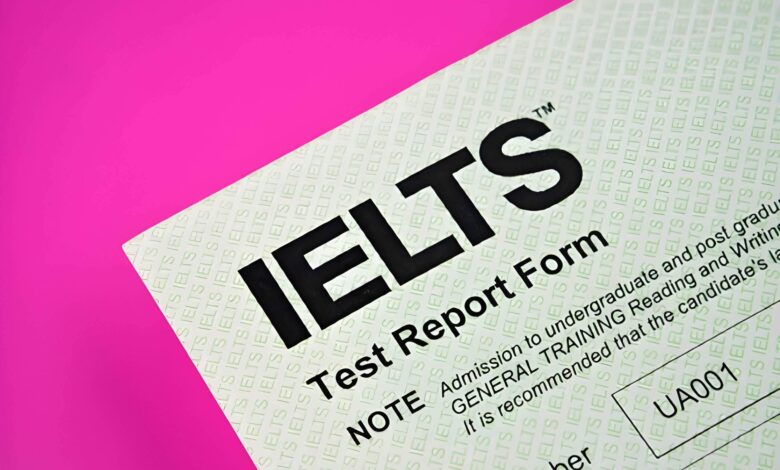The IELTS is a critical exam in Pakistan for students and professionals seeking opportunities abroad. It evaluates your English listening, reading, writing, and speaking skills, which are crucial for studying, immigrating, or working in English-speaking countries.
Understanding the IELTS Test Structure (all versions)
The IELTS test has four sections: Listening, Reading, Writing, and Speaking. The Listening, Reading, and Writing sections are always completed on the same day, in that order. Your Speaking test may be scheduled on the same day, or up to seven days before or after, depending on your test center.
| Section | Skill Tested | No. of Questions | Max Time |
|---|---|---|---|
| Listening | Understanding spoken English, varied accents | 40 | 30 minutes (+10 minutes transfer time) |
| Reading | Comprehension of written passages | 40 | 60 minutes |
| Writing | Essay writing skills | 2 Tasks | 60 minutes |
| Speaking | Fluency and coherence in spoken English | Interview with Examiner (3 Parts) | 11-14 minutes |
Important Tips:
- Time Management: Crucial for all sections; practice under timed conditions.
- Instructions: Follow them precisely to avoid losing marks unnecessarily.
- Relax on Test Day: Get ample sleep, arrive early, focus on doing your best.
IELTS band scores and their corresponding English language proficiency levels:
The IELTS exam uses a 9-band scale to measure English language ability. This table explains each band score and its corresponding proficiency level.
| IELTS Band Score | English Language Proficiency Level | Description |
|---|---|---|
| 9 | Expert User | Has fully operational command of the language with complete fluency, accuracy, and appropriateness. |
| 8 | Very Good User | Has fully operational command of the language, with only occasional inaccuracies or misunderstandings. Handles complex and detailed argumentation skillfully. |
| 7 | Good User | Has operational command of the language, with occasional inaccuracies, misunderstandings, and inappropriate usage. Understands detailed reasoning. |
| 6 | Competent User | Generally demonstrates effective command of the language despite inaccuracies and misunderstandings. Can manage complex language and follow detailed reasoning. |
| 5 | Modest User | Exhibits partial command of the language. Can cope with overall meaning in most situations, though likely to make many mistakes. Can handle basic communication in their own field. |
| 4 | Limited User | Basic competence is limited to familiar situations. Frequent problems with understanding and expression. Communication breakdowns are likely to occur. |
| 3 | Extremely Limited User | Shows partial understanding in very limited situations. Generally has significant problems using the language and experiences frequent breakdowns in communication. |
| 2 | Intermittent User | Unable to communicate except in the most basic instances using isolated words or short phrases. Significant difficulties in understanding spoken and written English. |
| 1 | Non-User | Essentially no ability to use the language beyond possibly a few isolated words. |
Key things to remember:
- Institutions set their own requirements: Always check what band score you need for your specific university, immigration program, or professional registration.
- It’s an average: Your overall IELTS band score is calculated by averaging your four section scores, and scores are rounded up or down as needed (e.g., a 6.25 average becomes a 6.5 band score).
What is the IELTS test fee in Pakistan?
In Pakistan varies depending on the test type and the test center you choose. Here’s a breakdown:
Test Types and Fees (as of February 2024)
| Test Type | British Council Fee (PKR) | AEO Fee (PKR) |
|---|---|---|
| IELTS Academic & General Training (Computer-Delivered) | 57,400 | 55,900 |
| IELTS Academic & General Training (Paper-Based) | 55,000 (Peshawar) | 55,000 |
| IELTS for UKVI (Paper-Based) | 55, 000 | 51,700 |
Important Notes:
- Fee Changes: These fees are subject to change. Always confirm the latest prices on the official test provider websites:
- British Council: https://www.britishcouncil.pk/exam/ielts
- AEO: https://www.aeo.com.pk/
- Additional Costs: Some test centers may charge additional fees for services like results transfer.
How to Pay
- Payment methods usually include online transfers, bank drafts, or cash deposits at specific banks. Check with your chosen test center for their accepted payment options.
How to Prepare for IELTS in Pakistan: A Step-by-Step Guide
The International English Language Testing System (IELTS) is a globally recognized exam demonstrating your proficiency in English. A good IELTS score opens doors to international universities, immigration programs, and professional opportunities. While it may seem daunting, with dedication and strategic preparation, you can achieve your desired IELTS band score. This guide simplifies the process for students in Pakistan.
Step 1: Choose Your IELTS Test Type
- Academic IELTS: Required for pursuing higher education or professional registration in primarily English-speaking countries.
- General Training IELTS: Applicable for immigration to Canada, Australia, and New Zealand, or for secondary level schooling and some work settings.
Step 2: Know Your Current English Level
- Take a practice test: Online mock tests help gauge your current reading, writing, listening, and speaking skills. It shows what IELTS band you might currently fall into.
- Honest self-assessment: Identify your strengths and weaknesses—focus on areas needing most improvement.
Step 3: Set Your Target Score
- Research Requirements: Universities and immigration programs have minimum IELTS score requirements. Set a realistic yet ambitious target.
- Give yourself time: Achieving score improvements, especially if the gap between your current level and target is big, takes consistent effort.
Step 4: Register for IELTS in Pakistan
- Test Providers: British Council and AEO (Australian Education Office) are the primary authorized IELTS test centers in Pakistan.
- Registration Details: Visit these websites for up-to-date test dates, locations, fees, and the online registration process:
- British Council: https://www.britishcouncil.pk/exam/ielts
- Book in Advance: Exam slots fill up quickly, register at least 2-3 months prior to your ideal test date.
Step 5: Develop a Personalized Study Plan
Here’s an example 8-week study plan structure. Adjust based on your timeline and needs:
| Week | Focus Areas | Practice and Resources |
|---|---|---|
| 1-2 | Overall IELTS familiarization, Grammar Fundamentals, Vocabulary Expansion | Official IELTS practice materials, Grammar textbooks/websites, Flashcards for vocabulary |
| 3-4 | Listening Strategies, Speaking Fluency | IELTS listening practice tests, Podcasts/Ted Talks, Find a speaking partner/mock speaking drills |
| 5-6 | Reading Speed and Comprehension, Writing Task 1 & 2 Structures | Reading Speed and Comprehension, Writing Task 1 & 2 Structures |
| 7-8 | Mock Tests, Weak Area Refinement, Exam Day Confidence Building | Full-length IELTS tests under timed conditions, Review errors, targeted practice, Visualization and deep breathing for stress management |
Step 6: Immerse Yourself in English
- Movies & TV Shows: Watch with English subtitles, then without. Analyze dialogue.
- News & Podcasts: Build listening comprehension and improve your understanding of various accents.
- Reading: Diverse material – articles, novels, blogs – builds vocabulary and comprehension.
- Conversations: Speak English whenever possible – friends, family, language exchange groups.
Step 7: Utilize Reliable Resources
- Official IELTS Materials: Practice tests, guides – offer accurate test simulation.
- Reputable Books: Cambridge IELTS series, “The Official Cambridge Guide to IELTS”
- Online Tutoring: Visit IELTS focused websites like foriEDU.com and get expert IELTS tutors
- Consider Coaching: If self-study is challenging, a structured class may improve efficiency.
Final Thoughts: The Keys to IELTS Success
The IELTS journey requires commitment and focused effort. There’s no single perfect path – tailor your plan to suit your learning style and timeframe. Remember, consistency is key. Regular practice, even in short bursts, builds momentum and solidifies your skills. Don’t underestimate the power of seeking feedback; whether it’s a teacher, an IELTS study group, or simply a friend with strong English skills, getting someone else’s perspective helps you improve. On test day, remain confident in the work you’ve put in. Trust your abilities, manage your time wisely, and express yourself clearly. IELTS preparation is not just about reaching a score; it marks a step forward in your overall English language proficiency, a tool that will aid you in many future endeavors. Good luck!




